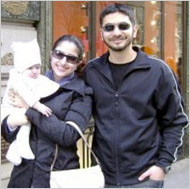Whenever a new terrorist plot unravels in the US in these times, it does not take too much to bet that it will have a Pakistani connection. In India, the phrase “Pakistani connection” has had to be so much overused, that it has become almost a joke and acquired the same meaning as “crying wolf”. Even when the same thing is repeating itself in the US, most Americans and definitely all Pakistanis refuse to see the Indians’ pain.
 With Faisal Shahzad dominating the airwaves and the internet, and even his wife Huma Mian hitting the peak of Google search trends today, it must feel hot to be in a Pakistani’s shoes in the US. The fact that this was a well-educated person, came from an educated, established family, and does not fit the profile of a Muslim fanatic with a long beard, does not makes it any easier for anyone. Unfortunately there is not enough condemnation of the acts of people like Shahzad among Pakistanis on the web. They are busier complaining about the difficulties they are going to face on planes. Here’s a sampling of the buzz going around on Twitter yesterday:
With Faisal Shahzad dominating the airwaves and the internet, and even his wife Huma Mian hitting the peak of Google search trends today, it must feel hot to be in a Pakistani’s shoes in the US. The fact that this was a well-educated person, came from an educated, established family, and does not fit the profile of a Muslim fanatic with a long beard, does not makes it any easier for anyone. Unfortunately there is not enough condemnation of the acts of people like Shahzad among Pakistanis on the web. They are busier complaining about the difficulties they are going to face on planes. Here’s a sampling of the buzz going around on Twitter yesterday:
“Upside of Faisal Shahzad episode: Super motivated 2 hit gym, look good in imminent airport nudie scans 4 Pakistanis wrldwide.”
“Also, he was quiet & kept 2 himself. Hmm, brown-skinned Muslim man with weak English in post-9/11 Amreeka. Surprising he didn’t mix up more.” (turned out he actually studied for years in the US – for his MS and MBA)
I don’t blame my co-traveler on a flight to view me with suspicion because by my looks I could very well be a Pakistani, although I know that the experience of being improperly taken off a flight, or being wrongly on a no-fly list can be harrowing. But for this I blame the fanatics who act like Shahzad, not the authorities. In an ideal world, only the guilty would be searched and all the innocent people would travel hassle free but we don’t live in an ideal world. If I am in airport security and I know most terrorist plots have a Pakistani connection, I will use my time most efficiently if I concentrate on the Pakistanis.
I am reminded of the moral of one of my favorite Hindi short stories in grade school. The story is called “Haar Ki Jeet” (the triumph of defeat), written by Sudarshan. It is about a monk named Baba Bharti, whose only worldly possession is his magnificent horse named Sultan, whom he loves more than his life. There is this decoit Kharag Singh who has set his evil eye on Sultan. One day when Baba Bharti is riding his horse, he sees a disabled man asking for a ride to his village. Baba Bharti lets the man ride with him, and the man turns out to be Kharag Singh in disguise. He pushes Baba Bharti from the horse and starts to run away. Baba, knowing that his horse is lost for ever, stops him and begs him to listen to him once. “Just do me a favor,” he says “Don’t mention this episode to anyone. Because if you do, no-one is ever going to trust a needy person asking for help.” Let us pause the story there. If Baba Bharti himself now mistrusts disabled people, who is to blame — Baba Bharti himself, or Kharag Singh? Fast forward, the story does have a happy ending. A few days later, the decoit quietly returns the horse to his empty stable near Baba’s hut in the middle of night. That happy ending seems to be far-fetched in the present day story of mistrust.
Now if Pakistanis are being mistrusted, and Muslims are being feared, who is to blame for that? The people who create this mistrust or the people who are being defensive. No don’t tell me these actions are in a justifiable reaction to what is happening in Iraq and Afghanistan. Because you are not avenging what is happening there by killing innocent bystanders and tourists in Times Square. The only real motivating factor for these actions can be the religious teachings that these people take seriously — kill the infidels. And I hardly see anyone in the Islamic world condemning these teachings, or clearly declaring that such teachings don’t exist.
It is not just Islam, you will find many religious books advocating violence, but Muslims take it too seriously. Listen to Bill Maher talking about the subject on CNN today:
Faisal Shahzad – Another Pakistan Connection
by
Leave a Reply